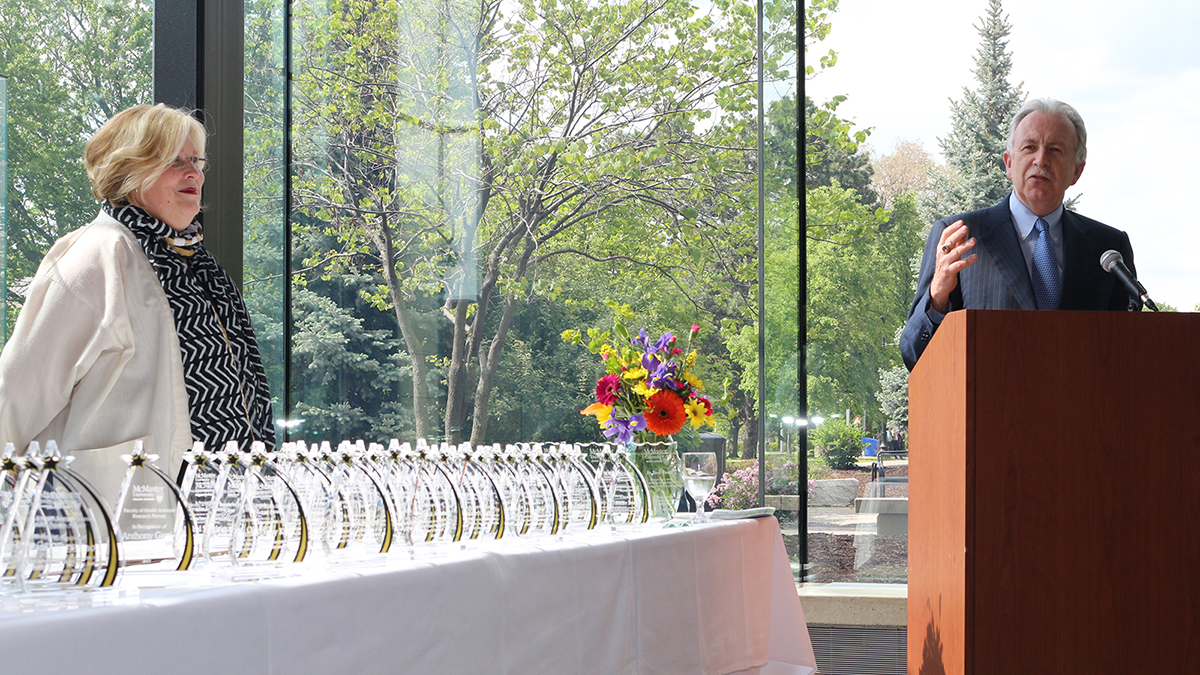Deborah Cook joins Canada’s Medical Hall of Fame

The Canadian Medical Hall of Fame has announced Deborah Cook, professor in the Department of Medicine at McMaster University, as a 2025 laureate.
Canadian Medical Hall of Fame laureates are Canadian citizens whose outstanding leadership and contributions to medicine and the health sciences, in Canada or abroad, have led to extraordinary improvements in human health. Their work may be a single meritorious contribution or a lifetime of superior accomplishments. Pioneers in their field are role models who inspire young Canadians to pursue careers in the health sciences.
“This honour is really for the entire critical care community dedicated to improving the outcomes of critical illness. It is a privilege to work with curious interprofessional colleagues in Hamilton and across the country who share my passion to make a difference for our patients and their families,” says Cook, a Distinguished University Professor at McMaster and a three-term Tier 1 Canada Research Chair in Knowledge Translation in Critical Care. Cook was awarded the McLaughlin Medal by the Royal Society of Canada in September.
Cook’s numerous contributions and achievements meet the criteria for the Canadian Medical Hall of Fame’s three categories:
Leadership in research with national and international recognition for scientific contributions
Throughout her career, Cook’s research has made high-impact, practice-changing scientific contributions that improve the care of critically ill patients worldwide. At the vanguard of patient-centered research in the intensive care unit (ICU), she has addressed the incidence, risk factors, cost, and prevention of gastrointestinal bleeding; the prevention, diagnosis, and management of ventilator-associated pneumonia; and the screening, diagnosis, and prevention of venous thromboembolism in critically ill patients.
By preventing common and often lethal complications, Cook’s sustained research excellence in the medical sciences has mitigated the enormous human and economic costs of critical illness for patients, families, and healthcare systems. Her research findings for patients needing advanced life-support provided key evidence informing bedside practice, and her studies have been incorporated into systematic reviews and guidelines across the globe.
Leadership in building excellence in health for Canadians and the world
To systematically reduce the toll of death and disability in ICUs, in 1989, Cook – as an early career scientist – co-founded the Canadian Critical Care Trials Group (CCCTG), the first nationalorganization dedicated to investigator-initiated clinical research. Leading with her own large multicenter study focused on upper gastrointestinal bleeding, she launched this collaborative – the first of its kind in the field – and in 1994 published her findings in the New England Journal of Medicine. This study revolutionized clinical research in the ICU setting, and under Cook’s leadership as a two-term chair, the CCCTG flourished. After 35 years, it remains the world’s most well-established critical care research consortium. Emulated by many scientists in Australia, the U.S., U.K., and countries in South America, Europe, and the Middle East, Cook’s integrated collaborative model inspired the creation of many new productive research networks in this field. In recognition of her exceptional mentorship of innumerable successful early career investigators, the Canadian Critical Care Trials Group created the Deborah J Cook Mentorship Award in her name.
Leadership in health promotion, illness prevention and care
In 2013, Cook created the 3 Wishes Project – an innovative, low-technology, low-risk, low-cost intervention that enhances end-of-life care by empowering clinicians to elicit and implement wishes for patients and their families. Many mixed-methods studies show how honouring each life and giving grieving families agency invokes a deeper sense of vocation among clinicians, aligning with high-quality end-of-life care. International evaluations found Cook’s 3 Wishes Project to be a valuable, transferrable, affordable, and sustainable intervention that identifies and meets the basic needs of dying patients by fostering personalized acts of compassion at times of unprecedented existential distress for those bearing witness to death – before and beyond the COVID-19 pandemic.
“Dr. Deborah Cook is the quintessential clinician-scientist in critical care medicine and a global authority on patient-centered research, whose pioneering investigations have transformed clinical research in the ICU into a Canadian-led academic force,” says Paul O’Byrne, dean and vice-president of the Faculty of Health Sciences. “She is respected throughout the world as a physician who has raised the standard of her field of practice with her unwavering focus on rigorous, clinically relevant, high-impact studies, research ethics, humanism in practice, and mentoring the next generation of scholars. Many congratulations to Deborah on this prestigious recognition.”
Laureates will be honoured at the Canadian Medical Hall of Fame Induction Ceremony next June, hosted in Hamilton by McMaster’s Faculty of Health Sciences.
“McMaster University’s Faculty of Health Sciences is delighted to host the 2025 Canadian Medical Hall of Fame Induction Ceremony,” adds O’Byrne. “The ceremony presents an exciting opportunity to celebrate highly-respected medical leaders whose significant achievements and contributions have had profound impact on patients, practice, policy and health research.”
Faculty & Staff, LeadershipRelated News
News Listing

Faculty of Health Sciences 2024: The year in awards
#Shorts, Faculty & Staff, Feature
December 10, 2024

McMaster professor emeritus named recipient of Canadian Blood Services Lifetime Achievement Award
Faculty & Staff, Leadership
December 5, 2024

